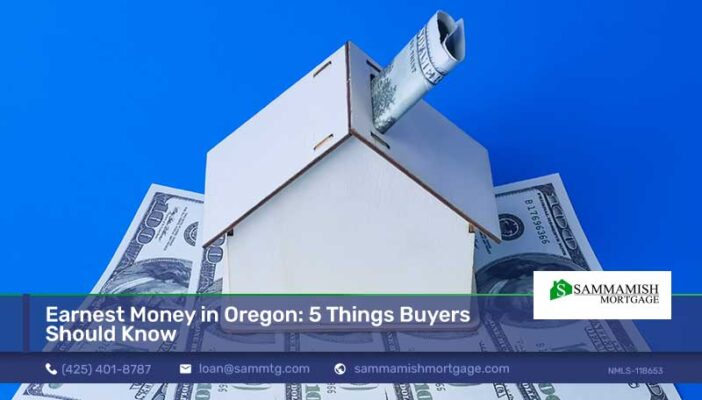No Obligation and transparency 24/7. Instantly compare live rates and costs from our network of lenders across the country. Real-time accurate rates and closing costs for a variety of loan programs custom to your specific situation.

Ready to think about buying a home in Oregon? Wondering how much earnest money you need to come up with? It all depends on how sure you are that the home is right for you, and how big of a statement you want to make to the seller that you’re a serious homebuyer.
You’re adding up the costs of buying a home, and trying to figure out where “earnest money” fits in. Exactly what earnest money is used for is varied, but you’ll definitely need some.
Your earnest money is separate from your down payment, so don’t conflate the two. Make sure that you have enough cash to cover both commitments. Make sure you have the contract clearly cover what happens to the earnest money if the purchase doesn’t go through as planned.
When you make an offer on a home and it’s accepted, you’ll generally be asked to put up a chunk of change known as “earnest money.” This money goes into an escrow account, which means neither you nor the seller can access it without requirements being met.
These requirements are typically laid out in the contract you enter into with the home seller. Many of these requirements are listed as “contingencies,” which help safeguard you in case the home purchase falls through.
On the seller’s part, the escrowed funds protect them in case you walk away for no good reason, after they have taken their house off the market (which a seller must do once they’ve accepted an offer.)
Not all home sales work out in the end. There are any number of reasons this could happen. The earnest money shows a good faith gesture on your part that you intend to buy the home, assuming no glaring problems surface. However, it’s not an ironclad promise, and you don’t necessarily forfeit those funds if the sale falls through.
Basically, the seller can typically keep the earnest money if all contingencies in the contract are met, but you end up not following through on the contract anyway, for whatever personal reason you have.
In any of these scenarios, you can still get out of your contract to buy the home, but the seller would likely get to keep the earnest money to compensate them for the time their home was off the market and the fact that they now have to relist it and start over with a new buyer.
Most of the reasons you would get to walk away with your earnest money intact depend on contingencies. A contingency protects you in case something unexpected turns up during the home purchase process. Some of the most common contingencies are:
In any of these scenarios, as long as it’s a contingency spelled out in and covered by your contract, you can back out and the earnest money will be returned to you.
The dollar amount you’re asked to put down as earnest money can vary depending on the circumstances. Usually, the earnest money is a set percentage of the sale price of the house, but this can range from 1% to 5%.
On a $500,000 house, this could mean anywhere from $5,000 to $25,000. In many cases, home buyers are encouraged to put up earnest money in an amount that comes close to covering the anticipated closing costs, which can again vary but is usually between 2% and 5% of the home’s sale price.
In many cases, you can get sellers to agree to cover some of the closing costs, so keep that in mind. If there’s any money left out of the earnest money after closing costs are paid, it can be applied to your down payment or refunded to you if you’ve already transferred the down payment funds.
Feeling like you just got a lot of information? Don’t worry. Your Loan Officer will go over the earnest money expectations with you when you make your offer on the home. The main things to keep in mind about your earnest money are these:
Now you know pretty much everything you need to know about earnest money, from where it comes from to where it goes, and how it is disbursed in case a home sale falls through. Make sure you go over the earnest money requirements with your lender and make sure the funds are deposited correctly with the right trustee to ensure they are handled properly throughout the homebuying process.
At Sammamish Mortgage, we make homebuying easy. Once you’ve secured your perfect home and obtained the mortgage you need to make your home purchase happen, we continue to support you throughout your homeownership journey with helpful blogs like this one.
Sammamish Mortgage has been in business since 1992, and has assisted many homebuyers in the Pacific Northwest. If you are looking for mortgage financing in Washington State, we can help you get preapproved. Sammamish Mortgage offers mortgage programs in Colorado, Idaho, Oregon, and Washington.
Contact a loan officer if you have any mortgage-related questions or concerns. If you are ready to move forward, you can view rates, obtain a customized instant rate quote, or apply instantly directly from our website.


Whether you’re buying a home or ready to refinance, our professionals can help.
{hours_open} - {hours_closed} Pacific
No Obligation and transparency 24/7. Instantly compare live rates and costs from our network of lenders across the country. Real-time accurate rates and closing costs for a variety of loan programs custom to your specific situation.